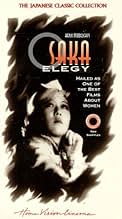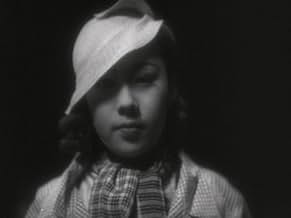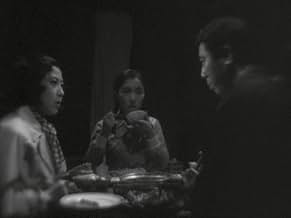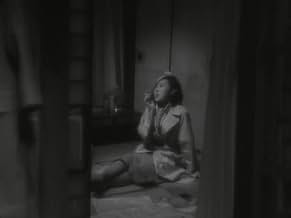IMDb-BEWERTUNG
7,2/10
2745
IHRE BEWERTUNG
Eine junge Frau wird zur Herrin Ihres Chefs, um Ihre Familie zu unterstützen.Eine junge Frau wird zur Herrin Ihres Chefs, um Ihre Familie zu unterstützen.Eine junge Frau wird zur Herrin Ihres Chefs, um Ihre Familie zu unterstützen.
Empfohlene Bewertungen
"Osaka Elegy" (Japanese, 1936): Directed by Kenji Mizoguchi. This is one of his earliest films. Japan was in the throes of a cultural turmoil. They were busy invading China, and feeling the schizophrenia of traditional vs modern society. This story is about a decent young woman, who, when familial pressure is applied, does anything necessary to pay the bills of a pathetic father, a self-centered brother, and a confused, naïve sister, and, a keep an abusive boss "happy". As we might expect (now), her road darkens as everyone demands more and more, gives back less and less, and shuns her for doing what they suggested and made their advantage. Expect a noir-ish look to the film, with spare traditional home sets and costuming, contrasted with high style business/commercial sets and costuming.
I believe the challenge here was to conceive of a film in terms of bunraku - the traditional Japanese puppet theater - and extrapolate from the environment a structure, so one stage where heightened drama unfolds, controlled, with a view of the mechanisms handling the illusion, and then a second stage on the side to supply a rotation of music and voice expressing emotion. This is very well thought out, something to keep in mind when viewing later Mizoguchi where melodrama lacks annotation.
This translates in our film as melodrama about a bold young woman who gambles away on her dignity and reputation because the world around her is desperate for either money or sex, the controlling mechanism is that only the viewer is in possession of all the facts and so is able to read tragic fate in every exchange. This has been noted by some viewers as film noir, because the woman appears to function as a femme fatale, but the Japanese have no affinity for this sort of trope.
So of course, in accordance with bunraku, the woman is a puppeteer but also herself a puppet, a figure on the same stage as the play she enacts, her movements subject to our scrutiny. You will note this in tandem with, and reversing, an earlier Mizoguchi - The Water Magician - about a water artist whose life is merged with the transitory flows she used to control.
This is beautifully rendered in a scene where she is caught with her boss on a night out to watch a bunraku play. She has set a plot in motion, attempting control, an active role, but unpredictable life foils her. The wife demands explanations but seems the most irate for noticing the hairstyle on the girl, signifying a married woman, her role on the stage being supplanted even though it's a loveless marriage and thankless role. Moments before, however, we have seen an excerpt from the play, where inside the artifice, the controlled fiction, it was the suspicious husband accusing the woman of adultery.
This would have an ordinary ironic effect if mapped cleanly to the situation outside the stage, but it doesn't, it's wholly asymmetrical, the tension all in the imbalance of familiar elements framed askew. You have to puzzle about assigning to the players the puppet-master's controls. This is the touch lacking in Ozu's Floating Weeds.
The music is not in the emotional after-effects of storytelling, this too part of the heightened artifice. The music is in the camera, caressing day from night.
This translates in our film as melodrama about a bold young woman who gambles away on her dignity and reputation because the world around her is desperate for either money or sex, the controlling mechanism is that only the viewer is in possession of all the facts and so is able to read tragic fate in every exchange. This has been noted by some viewers as film noir, because the woman appears to function as a femme fatale, but the Japanese have no affinity for this sort of trope.
So of course, in accordance with bunraku, the woman is a puppeteer but also herself a puppet, a figure on the same stage as the play she enacts, her movements subject to our scrutiny. You will note this in tandem with, and reversing, an earlier Mizoguchi - The Water Magician - about a water artist whose life is merged with the transitory flows she used to control.
This is beautifully rendered in a scene where she is caught with her boss on a night out to watch a bunraku play. She has set a plot in motion, attempting control, an active role, but unpredictable life foils her. The wife demands explanations but seems the most irate for noticing the hairstyle on the girl, signifying a married woman, her role on the stage being supplanted even though it's a loveless marriage and thankless role. Moments before, however, we have seen an excerpt from the play, where inside the artifice, the controlled fiction, it was the suspicious husband accusing the woman of adultery.
This would have an ordinary ironic effect if mapped cleanly to the situation outside the stage, but it doesn't, it's wholly asymmetrical, the tension all in the imbalance of familiar elements framed askew. You have to puzzle about assigning to the players the puppet-master's controls. This is the touch lacking in Ozu's Floating Weeds.
The music is not in the emotional after-effects of storytelling, this too part of the heightened artifice. The music is in the camera, caressing day from night.
There are so many interesting things going on in this film, and several of them surprised me. I loved Ayake (played by Isuzu Yamada) and the voices of the women in general. I couldn't help but contrast Ayake's headstrong will and fierceness to Yasujiro Ozu's Noriko in Tokyo Story (played by Setsuko Hara). Noriko was the perfect picture of traditional grace and dedication in a Japanese woman and she fit in perfectly with Ozu's straight lines and symmetrical framing. Ayake, on the other hand, is shadowed by an almost conspiratorial camera which cleverly spies on the fore and background simultaneously, and creeps behind walls and curtains to follow the characters and listen in on their conversations, amplifying the sense of daring and defiance of Ayake's character. The inventiveness of so many varying shots stole my attention more than anything else, though I also appreciated the quick and steady pacing of the story as it unfolded, predominantly led by Ayake.
http://funkyforestfirstcontact.wordpress.com/i-just-saw/
http://funkyforestfirstcontact.wordpress.com/i-just-saw/
...with a plot out of Precode Hollywood and frequent jazz music to match. A pretty young switchboard operator reluctantly decides to become the mistress of her boss so she can help her financially-strapped father who had embezzled company funds for an investment that went bad, and her college-student brother who needs his tuition paid. Of course she is ostracized from the family for her immorality without giving her the chance to explain how they got their money. Various other relationships and subplots also come into play. This one has nicely-plotted character dynamics, good performances, and beautiful cinematography.
Ayako (Isuzu Yamada) becomes the mistress of her boss, Mr. Asai, so she can pay her father's debt, and prevent him from going to prison for embezzlement. She also sends money to her brother Hiroshi to pay his university tuition, but her father intercepts it.
Mizoguchi considered the film his first serious effort as a director, and while I am not familiar with his earlier work, I have to say this is the kind of film that leaves a mark. Either Mizoguchi or his cinematographer had an excellent awareness of the camera -- the door closing to block the camera early on in the film -- years ahead of its time.
The subject matter in general is impressive. I am not sure what the typical morality was in pre-war Japan, but to feature adultery and whatnot in the 1930s seems quite bold.
Mizoguchi considered the film his first serious effort as a director, and while I am not familiar with his earlier work, I have to say this is the kind of film that leaves a mark. Either Mizoguchi or his cinematographer had an excellent awareness of the camera -- the door closing to block the camera early on in the film -- years ahead of its time.
The subject matter in general is impressive. I am not sure what the typical morality was in pre-war Japan, but to feature adultery and whatnot in the 1930s seems quite bold.
Wusstest du schon
- Zitate
Junzo Murai: You're a woman... Being taken to the police station... Getting thrown into jail... You've done shameful things. You ungrateful child!
Ayako Murai: How could you say that? I never expected that I'd be treated like this when I came home. This is ridiculous! I thought you would welcome me with open arms. If I'd have known this, I never would have come back.
Top-Auswahl
Melde dich zum Bewerten an und greife auf die Watchlist für personalisierte Empfehlungen zu.
- How long is Osaka Elegy?Powered by Alexa
Details
- Laufzeit
- 1 Std. 11 Min.(71 min)
- Farbe
- Sound-Mix
- Seitenverhältnis
- 1.37 : 1
Zu dieser Seite beitragen
Bearbeitung vorschlagen oder fehlenden Inhalt hinzufügen













